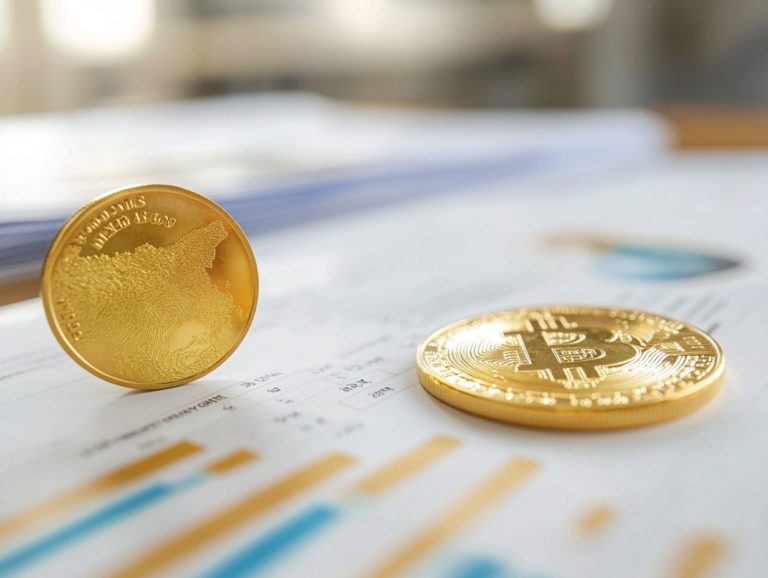How to Keep Track of Tax Records for Precious Metals
Navigating the world of precious metals can be thrilling. However, it comes with unique tax obligations you need to be aware of. Keeping accurate tax records is essential for compliance and maximizing your financial benefits.
Let s explore why keeping track of these records is crucial for your success! This piece highlights which types of metals require documentation. You ll find practical tips on effective record-keeping methods that can streamline your process, including essential tax forms, deadlines, and typical pitfalls to avoid.
Whether you re an investor or a collector, mastering tax record management can save you considerable time, money, and stress. This allows you to focus on what truly matters in your precious metals journey.
Contents
- Key Takeaways:
- Why You Must Track Tax Records for Precious Metals
- Types of Precious Metals that Require Tax Records
- How to Keep Track of Tax Records
- Tax Forms and Documents for Precious Metals
- Tips for Organizing and Storing Tax Records
- Common Mistakes to Avoid
- Frequently Asked Questions
- What steps should I take to track tax records for precious metals?
- Do I need to keep physical copies of my tax records for precious metals?
- How often should I update my tax records for precious metals?
- What information should be included in my tax records for precious metals?
- Can I deduct any expenses on my taxes related to precious metals investments?
- How long should I keep my tax records for precious metals?
Key Takeaways:
- Keeping proper tax records for precious metals is crucial for tax purposes, including reporting capital gains and losses.
- Gold, silver, and platinum are taxable precious metals that require accurate records for tax filing.
- Utilize record-keeping methods like spreadsheets or software, and stay organized with a designated space for storing tax documents to avoid common mistakes and ensure compliance.
Why You Must Track Tax Records for Precious Metals
Maintaining detailed tax records for precious metals like gold, silver, platinum, and palladium is essential for IRS compliance. It also helps you fully grasp the tax implications of your investments.
Accurate record-keeping is not just a formality; it plays a critical role in fulfilling reporting requirements. It enables you to calculate capital gains and monitor investment returns. You can also establish a clear cost basis, which is the original value of an asset for tax purposes, for each transaction. For those investing in precious metals, navigating complex tax issues is essential to ensure compliance and optimize your financial outcomes.
This diligent approach protects you from potential penalties during audits. It also fosters financial transparency, allowing both you and your tax professionals to manage your investment portfolios with greater efficacy.
Importance for Tax Purposes
Understanding the significance of tax records for precious metals is crucial for meeting reporting requirements and ensuring tax compliance. This is particularly important for capital gains tax on profitable transactions.
Your records act as a foundational tool as you navigate the intricate world of investment returns. They provide a chronological account of your trades and transactions, enabling you to accurately calculate capital gains.
This accuracy is crucial for completing forms like Form 8949 and Schedule D. With organized and detailed records, you can confidently substantiate your gains and losses, significantly reducing the risk of errors that could lead to an audit.
Neglecting proper record-keeping can lead to severe consequences. Unexpected penalties and interest charges may far outweigh any tax savings you hope to achieve.
By maintaining meticulous documentation, you facilitate accurate reporting and protect yourself against the financial fallout of non-compliance.
Types of Precious Metals that Require Tax Records
You need to keep detailed tax records for metals like gold coins, silver bars, and bullion coins. These items are classified as collectible capital assets under IRS regulations, making careful documentation essential for compliance.
Identifying Taxable Metals
Identifying which metals are taxable is vital for complying with IRS regulations. It ensures you accurately account for potential capital gains from your investments.
When evaluating the taxability of precious metals, consider several factors: the type of metal, its form, and its intended use. For instance, gold and silver coins may be treated differently depending on whether they are classified as collectibles or primarily viewed as investments. It’s also important to know what tax records to keep for precious metals investments to ensure compliance.
Reflecting on your financial strategy is also important. Your approach can significantly influence how these assets are managed. Remember, market integrity is crucial; fluctuations in supply and demand directly impact the valuation of precious metals. This, in turn, affects your tax considerations and potential returns.
Are you ready to take control of your precious metals tax records? Start organizing your records today for a stress-free tax season!
How to Keep Track of Tax Records
Maintaining tax records for your precious metals requires you to adopt effective record-keeping practices that ensure both accuracy and adherence to tax laws related to your financial responsibilities.
By establishing a detailed system, you can navigate your obligations with confidence and ensure that every detail is accounted for.
Record-Keeping Methods
Using effective record-keeping methods is crucial for tracking your investment expenses and profits. This makes the audit process for your precious metal investments much smoother.
In today s digital landscape, employing modern digital tools like accounting software can streamline the tracking of these financial details. These tools offer features that automatically categorize and update your records in real-time, saving you time and effort.
If you prefer a more hands-on approach, spreadsheets provide an accessible format that allows for customized tracking of each transaction. Manual logs can also be beneficial; however, they require diligent upkeep to ensure that no data slips through the cracks.
No matter which method you choose, adhering to best practices such as regular updates, clear labeling of entries, and maintaining organized documentation is vital for enhancing clarity and accuracy. These steps not only simplify ongoing assessments but also create a sturdy safety net for any potential audits down the line.
Tax Forms and Documents for Precious Metals
Filing tax forms accurately is essential when it comes to reporting your precious metal investments. Pay particular attention to Form 8949 and Schedule D, as these documents detail your capital gains and losses from asset transactions.
Ensuring precision in these filings can help you navigate the complexities of tax obligations with confidence.
Required Forms and Deadlines
Understanding the necessary forms and deadlines for precious metals is essential for fulfilling your tax obligations and ensuring timely reporting to the IRS.
Navigating these tax responsibilities requires attention to two key documents: Form 8949 and Schedule D. You’ll need to complete these forms with precise details for each transaction, including the acquisition date, sale date, cost basis (the original value of an asset), and proceeds. For those investing in precious metals, understanding navigating tax regulations is crucial.
Given the variability of precious metal transactions, maintaining detailed records is crucial to support any claims you make. Don’t miss deadlines! Missing them can lead to penalties or interest charges, highlighting the importance of prompt submission to steer clear of complications with the IRS. For guidance on how to manage these records effectively, consider how to track your precious metals for tax purposes.
Tips for Organizing and Storing Tax Records
Keep your tax records organized! This helps you maintain a clear view of your investment portfolio and ensures compliance with best practices in the financial system.
This diligent approach not only enhances your financial oversight but also contributes to a more streamlined and efficient management of your assets.
Best Practices for Maintaining Records
Adhering to best practices in maintaining records for precious metals not only ensures compliance with tax laws but also elevates your financial transparency.
To effectively manage these essential documents, implement a system of regular updates, ensuring that all transactions are recorded promptly and accurately.
Secure storage solutions think encrypted digital files or locked physical safes are vital in protecting sensitive information from unauthorized access.
Conduct periodic reviews of all records to identify any discrepancies early, ensuring the overall integrity and reliability of your reporting. This systematic approach safeguards against errors and fosters a culture of accountability and trust in your financial practices.
Common Mistakes to Avoid
Being aware of common mistakes in managing tax records for precious metals is crucial. Doing so allows you to avoid reporting errors, penalties, and potential complications during the audit process.
Attention to detail in this area can safeguard your financial interests and ensure a smoother experience when it comes time to report.
Errors to Watch Out For
Errors in record-keeping can lead to significant tax issues. Stay alert about your tax responsibilities when dealing with precious metals.
Many individuals overlook the importance of calculating their cost basis accurately. This mistake can result in overpaying taxes on gains.
Failing to report foreign investments can also cause serious compliance problems. Consequences may include hefty fines or audits.
To avoid these pitfalls, keep detailed records of every transaction. Note the purchase dates and amounts to safeguard your investments.
Using a reliable tracking system is essential. Consulting a qualified tax professional can help you manage all aspects of investment reporting legally.
Frequently Asked Questions
What steps should I take to track tax records for precious metals?
Gather all receipts and invoices for your precious metals purchases and sales. This is the first step in keeping your tax records organized.
Do I need to keep physical copies of my tax records for precious metals?
It s best to keep physical copies of your tax records. However, electronic copies are also acceptable and can be convenient.
How often should I update my tax records for precious metals?
Update your tax records every time you buy or sell precious metals. This ensures accuracy in your documentation.
What information should be included in my tax records for precious metals?
Your tax records should list the date of each purchase or sale. Include the type and quantity of metals, the price, and any related fees.
Yes, certain expenses like storage fees can be deducted. Be sure to keep a record of these costs in your tax documentation.
How long should I keep my tax records for precious metals?
Keep your tax records for at least 7 years in case of an IRS audit. For your own peace of mind, consider keeping them indefinitely.














